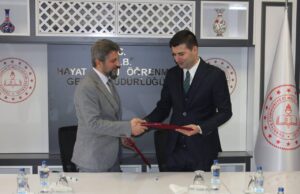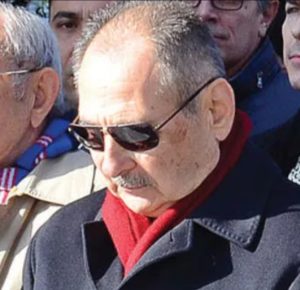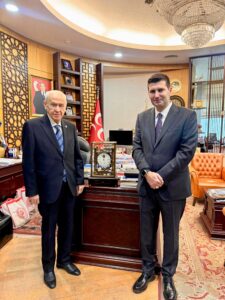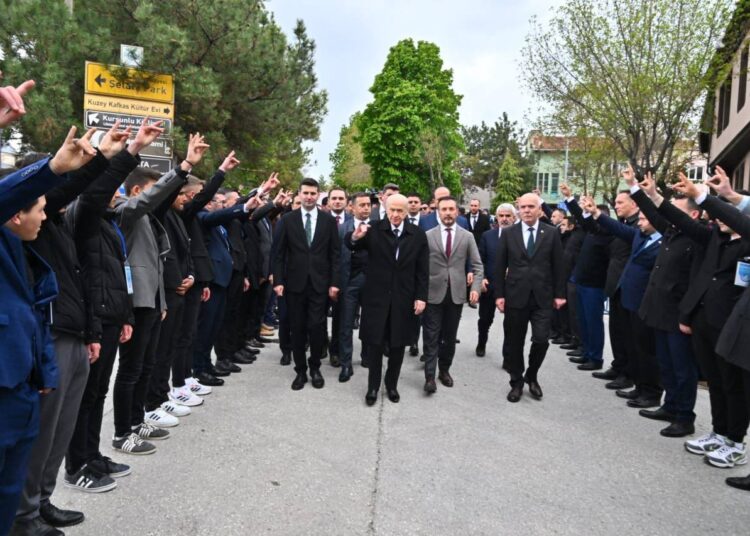Abdullah Bozkurt/Stockholm
An official protocol allowing Turkey’s violent far-right group to send instructors for public education programs — reaching millions — further highlights how Turkey, under the government of President Recep Tayyip Erdogan, has been transformed into an extremist state driven by neo-Ottoman ambitions.
On the last day of 2024, the Ministry of National Education (MEB) signed a protocol with the Ülkü Ocakları Education and Culture Foundation (Ülkü Ocakları Eğitim ve Kültür Vakfı), the youth wing of Turkey’s far-right Nationalist Movement Party (MHP), a close ally of President Erdogan’s ruling Justice and Development Party (AKP).
As a result, thousands of educational programs attended by over a million students risk becoming ideological breeding grounds for Ülkü Ocakları — a group driven solely by its own political agenda, rooted in discrimination and marginalization, rather than a commitment to fostering knowledge, skills and critical thinking.
The protocol bears the signature of Ahmet Yiğit Yıldırım, the president of Ülkü Ocakları, who was once a suspect in the murder of his own colleague. On the government’s side, Cengiz Mete, head of the Ministry of National Education’s General Directorate for Lifelong Learning (Hayat Boyu Öğrenme Genel Müdürlüğü in Turkish), signed the agreement.
Ülkü Ocakları (also known as the the Gray Wolves—Bozkurtlar—or Idealist Hearths — Ülkücüler) is a conservative nationalist and Islamist group whose members aspire to establish a pan-Turkic state across former Ottoman territories. The group has been linked to various forms of organized crime, including drug trafficking and contract killings. It has been banned in several European countries with significant Turkish diaspora communities.
The protocol signed between the far-right group Ülkü Ocakları and Turkey’s Ministry of National Education on December 31, 2024:
According to the protocol, the group’s foundation will be authorized to organize general, vocational and technical courses under the ministry’s public education programs, primarily targeting young adults. In practice, however, minors in Turkey also attend such courses. These centers have also provided training and education to convicts and foreigners.
Given that the group lacks genuine expertise in offering technical and vocational courses, the true purpose of the protocol appears to be granting Erdogan’s ally access to a large segment of the younger generation for indoctrination in Turkish ultranationalist ideology, recruiting new members and strengthening the ranks of the far-right party.
With political backing from the government, the group had for years collaborated with public schools at the local level, gaining access to classrooms and sending instructors to promote MHP propaganda. With this protocol, it has now secured the ability to operate on a national scale.
Following the signing of the protocol, the MEB issued a communiqué on January 2, instructing all provincial branches to cooperate with the Ülkü Ocakları Foundation and facilitate its activities in schools and courses organized by the Lifelong Learning Centers. These courses are often offered free of charge and are funded either by taxpayers or affiliated foundations.

The latest statistics reveal that the General Directorate for Lifelong Education operates 1,032 centers across Turkey, providing education and training not only for adults but also for minors, starting at middle school (Ortaokul) age. In 2023 just over 11 million people enrolled in courses offered by the directorate and its partners. As of January 2024 a total of 73.3 million people have benefited from these programs.
Critics argue that the protocol violates both the constitution and the fundamental law on national education, which prohibits political propaganda in public and educational institutions.
However, neither President Erdogan nor his ally, MHP leader Devlet Bahçeli, appear concerned with the law, and there is no institution left in Turkey capable of holding them accountable. The Erdogan-Bahçeli pair completely dominate the judiciary, law enforcement, the legislative branch and the media, allowing them to formulate any policy they choose and face no consequences.
Like the far-right group, Erdogan’s political Islamist allies also have protocols with the Ministry of Education to promote their ideology and recruit new followers from the young student population.

The most recent data on the number of such protocols signed by the MEB was provided by Education Minister Yusuf Tekin in December 2023. He stated that there were 2,709 valid protocols, 1,167 of which were made with official institutions. In other words, more than half of the protocols signed by the MEB were with nongovernmental entities. The government has yet to disclose the full list of these entities.
The youth branch of Ülkü Ocakları is known as the muscle of the MHP and has been linked to violence, murders, drug trafficking and other organized criminal activities. It has also been documented that the Turkish intelligence agency, MIT, has used the group to recruit gunmen for clandestine operations both in Turkey and abroad.
In fact Şenkal Atasagun, a former head of MIT, has long been involved with the MHP as the chief advisor to party leader Bahçeli. While serving as the intelligence chief between February 1998 and June 2005, Atasagun worked closely with the MHP and recruited notorious hitmen from Ülkü Ocakları for contract murders. Atasagun is believed to be one of the main masterminds behind the far-right politics of the MHP.
When Ülkü Ocakları members run into trouble with the law, they are often well protected by the Turkish judiciary and police since the MHP has a significant number of loyal followers in senior ranks within critical state institutions.

It is certainly no coincidence that in recent years, the MHP has secured the release of many convicted criminals, including those serving life sentences for murder. As a token of their appreciation, notorious mafia bosses have rushed to pay their respects to MHP leader Bahçeli in his office following their release.
The group operates under mafia-like rules, demanding absolute loyalty and not hesitating to resort to violence, including murder, to intimidate opponents and critics. It has no qualms about eliminating its own members if the group believes they have broken ranks or betrayed the cause.
The most high-profile of such murders took place in broad daylight in Ankara on December 30, 2022, when Sinan Ateş, the former leader of Ülkü Ocakları, was gunned down.
The murder is believed to have been sanctioned by the MHP leadership. The gunmen were found to have links to the MHP and were sheltered by senior party figures. The killers were provided with real-time intelligence on the victim’s location from the police, an agency where MHP members have a significant influence and presence. Their trip from Istanbul to Ankara, carrying out the execution of a hit contract, was escorted by special police force units, ensuring they could bypass police checkpoints along the way.

The case was eventually derailed, and about two dozen suspects, including Yıldırım, the current leader of Ülkü Ocakları, and MHP lawmaker Olcay Kılavuz, were spared from legal consequences. Last month, Turkish prosecutors dropped the investigation into all of them. Sinan Ateş’s widow, Ayşe Ateş, condemned the prosecutors’ decision, stating that the ruling leaves key questions unanswered.
“This decision means the masterminds behind my husband’s murder will never be held accountable,” she said in a statement on X. “While those with blood on their hands are allowed to live freely, my daughters and I are left to live under constant threats.”
The unhindered access to national education platforms for far-right groups paves the way for a tectonic shift in Turkey’s population, with a strong push toward the extreme right. This will likely result in historic revisionism, the distortion of facts in the education curricula, suppression of critical thinking and, ultimately, the erosion of an inclusive democratic society.
This would not only pose a threat to Turkey’s democracy, pluralism and diversity — already in serious trouble under the repressive rule of the Erdogan regime — but would also present significant challenges for its neighbors in Turkey’s immediate vicinity and beyond.












